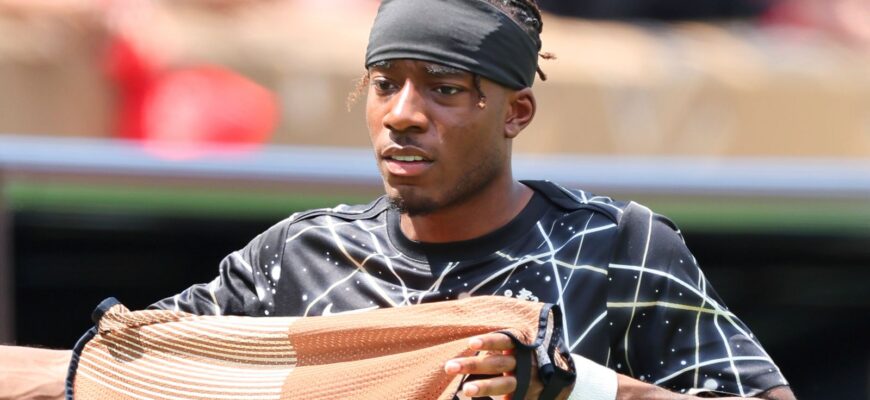Chelsea`s ownership group has been remarkably consistent in articulating their long-term vision for the club: build a stable, successful future around a `portfolio` of young, high-potential players. This strategy, frequently highlighted by figures like Todd Boehly, suggests a commitment to nurturing talent and allowing a core group to mature together over several years.
Given this stated philosophy, recent reports suggesting Chelsea are in discussions with rivals Arsenal over the sale of winger Noni Madueke, potentially for a fee approaching $70 million, present a curious paradox. While the proposed fee is substantial – nearly double the price paid for the player just 18 months prior – the idea of offloading a young player who appears to be hitting his stride seems to run directly counter to the very blueprint the club claims to follow.
Madueke`s Ascent: Data Overcomes Doubt
On the surface, Noni Madueke`s raw output in the 2024-25 season (11 goals, 5 assists in 46 appearances) might not immediately scream `indispensable`. However, a deeper look at the underlying statistics reveals a player undergoing significant development and impacting games positively. Despite a slight underperformance against expected goals (npxG) and expected assisted goals (xAG), Madueke demonstrated a crucial trait for any attacking player: getting into positions to influence the game.
His average of three and a half shots per 90 minutes in the Premier League last season was exceptional among wingers, statistically placing him ahead of prominent attackers like Bukayo Saka and Mohamed Salah in this specific metric. Crucially, the *quality* of his shots improved dramatically, with his non-penalty expected goals per shot more than doubling. This wasn`t just speculative shooting; it reflected a player consistently creating high-value opportunities, often through challenging defenders directly.
Furthermore, metrics assessing a player`s overall positive influence on possession value paint Madueke as highly effective. While the subjective `eye test` might occasionally perceive him as prone to running down blind alleys – a characteristic perhaps inherent to dynamic wingers pushing boundaries – the objective data suggests his on-ball actions disproportionately contribute to positive outcomes. His progressive carrying numbers were also elite, comparable only to top performers in the league.
The Conundrum: Attitude or Asset?
So, if the data supports Madueke`s value and upward trajectory, why would Chelsea consider letting him go? The primary arguments appear to centre on perceived attitude or work rate issues, which have reportedly led to public admonishments from manager Enzo Maresca, and the potential to reinvest a considerable transfer fee elsewhere.
Yes, there have been instances – Maresca`s comments about training intensity or the well-documented penalty incident with Cole Palmer – that raised questions about Madueke`s temperament. Yet, it seems pertinent to note that despite these concerns, his performance and statistical impact saw a marked improvement over the past season. This raises a question: does the occasional perceived attitude issue negate the tangible on-field value and potential for future growth?
The allure of the $70 million figure is undeniable. The temptation to `flip` Madueke and pursue other targets – perhaps players deemed a better stylistic fit or simply the next shiny new object on the market – is a familiar narrative in football. However, as data analytics guru Ian Graham once noted, even transfers with high confidence levels essentially boil down to a 50-50 chance of success. Chelsea would be trading a known quantity – a player who has already demonstrated improvement, delivered significant minutes for a team challenging for European spots, and represents a return on investment – for the inherent uncertainty of a new acquisition, regardless of the alternative player`s reputation.
Selling to a Rival: Adding Insult to Injury?
Adding another layer of complexity, the proposed destination is Arsenal. Selling a young, improving player with high statistical output to a direct rival feels less like shrewd portfolio management and more like providing a competitor with a potentially valuable asset while simultaneously contradicting one`s own strategic principles. It strengthens a competitor and weakens the implementation of Chelsea`s stated plan in one move.
Considering Chelsea`s public commitment to building for the future with young talent, Noni Madueke appears to be precisely the type of player they should be nurturing, not selling. His statistical progression suggests he is on a path towards becoming a high-level performer, aligning perfectly with the `portfolio` concept. Sacrificing such a player, especially to a rival and for the unpredictable outcome of reinvestment, risks being judged in hindsight not as a smart piece of business, but as a significant, potentially costly, deviation from their own stated path.








